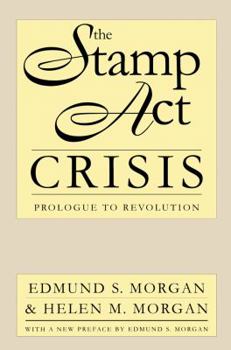The Stamp Act Crisis: Prologue to Revolution
Select Format
Select Condition 
Book Overview
'Impressive . . . The authors have given us a searching account of the crisis and provided some memorable portraits of officials in America impaled on the dilemma of having to enforce a measure which they themselves opposed.'--New York Times
'A brilliant contribution to the colonial field. Combining great industry, astute scholarship, and a vivid style, the authors have sought 'to recreate two years of American history.' They have...
Format:Paperback
Language:English
ISBN:0807845132
ISBN13:9780807845134
Release Date:March 1995
Publisher:Omohundro Institute and Unc Press
Length:342 Pages
Weight:1.27 lbs.
Dimensions:0.9" x 6.1" x 9.2"
Customer Reviews
2 ratings
Excellent treatment
Published by Thriftbooks.com User , 17 years ago
It is often written that the American Revolution had several causes, the predominant instigator being the 1765 Stamp Act, a resolution that levied a tax against the colonies that the Americans found so reprehensible that it spawned the drive towards revolution. Edmund and Helen Morgan's The Stamp Act Crisis: Prologue to Revolution is a worthy examination of this critical event that factored so heavily in American history. The Morgans focus the Stamp Act's effects on one specific colony, Massachusetts. Through the events leading to its passage, its aftershocks, and its repeal, we see the journey through the eyes of key men such as Governor Francis Bernard, Pamphleteer Daniel Dulany, and royal stamp customs officers Jared Ingersoll and John Hughes. The book follows a fledging country growing through spasms of confusion, chaos, and violence as it replaces its moderation and humility with a radical level of assertiveness and initiative. The Stamp Act Crisis serves to tell its story from the city of Boston, the nest egg where much of the conflict revolving around the Stamp Act occurred. Morgan details the fallout from the Stamp Act's passage, from the creation of mobs under the guidance of the political elite, to the character makeup of the mob leaders themselves. The mass chaos and almost complete lack of societal functioning is given its due course. With the Stamp Act's law requiring stamped documents for daily business activities like bills of laden for ships and legal documents for lawyers, the absence of these stamps prevented customs houses from clearing ships or courts from hearing cases. Law and commerce effectively ceased. The building discomfort in Boston, and throughout the colonies, was palpable through Morgan's descriptions. Morgan dedicates individual chapters to examining key players in Boston. Often, portrayals of unpopular figures of the times are kept to a narrow, unrefined assessment. But, Morgan accepts this challenge by consistently viewing the events of the budding revolution through the eyes of these unfortunate men, giving the reader a more unusually balanced perspective. Using extensive eyewitness accounts from newspapers, journals, letters, and Parliament and legislative sessions, Morgan's book immerses the reader into the historic events of the 1760s. The book is not for the novice, its narrative quickly jumping into the intrigue and difficulties of colonial America. It does not dwell on exploring the difficulties of the early 1760s other than to briefly discuss the complexities of the Sugar Act. There is no bombast of the Boston Tea party or the coming battles of the Revolution and while the narrative is not engaging like a good novel, there are sparks of intuitive analysis that make you nod your approval as you watch the events of history unfold.
Informative, but Patriotic Bias
Published by Thriftbooks.com User , 24 years ago
This work is worth the read simply because of the stature of the author. It remains the most comprehensive treatment of the Stamp Act crisis. Morgan's writing is, as always, highly readable. This interpretation disputes the Progressive interpretation that the colonists were acting merely for economic self-interest. Morgan argues that they genuinely believed in the constitutional principles they advocated, and did not simply use them to "get ahead." The writing has an overly Patriotic slant, however, and would have benefitted from information in Lawrence Gipson's "The Coming of the Revolution," which appeared a year after this publication. Students of the era are better served by Morgan's "Birth of the Republic," which covers a broader period and better explains his anti-Progressive thesis. It contains less of the minute detail relating to the crisis, but maintains his argument. I'm a big fan of Morgan's, by the way.






